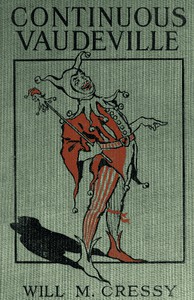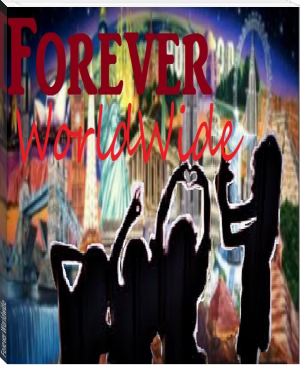Continuous Vaudeville by Will M. Cressy (best thriller novels to read txt) 📖

- Author: Will M. Cressy
Book online «Continuous Vaudeville by Will M. Cressy (best thriller novels to read txt) 📖». Author Will M. Cressy
A policeman is a "Bobbie."
You drive to the left and walk to the right.
An automobile is a motor car.
The carburetor is the mixer.
The storage battery is the accumulator.
Gasolene is petrol.
Ask your way and instead of saying "second street to the left" they will say "second opening to the left."
If they bump into you instead of saying "excuse me" or "pardon me" they say "sorry."
Your trunks are "boxes," and your baggage checks are "brasses."
Your hand baggage is "luggage."
[144]I found English audiences just as quick, just as appreciative and even more enthusiastic than our American audiences—if you talked about things they understood and in words they understood.
But the average American talking act is talking what might just as well be Greek to them. I never realized until I played in England what an enormous lot of slang and coined words we Americans use.
Another thing that we Americans are shy on, both in speaking and singing, is articulation. I always had an idea that I enunciated uncommonly clearly—until I went over there, when I learned more about speaking plainly in three days than I had in a lifetime here.
You will notice you can always understand every word and syllable uttered by an English singer.
One of the funniest things I saw over there were English actors trying to play "Yankee" characters. The only "Yankee" they had to it was to spit and say "By Gosh."
Upon the occasion of our first show in England, at Manchester, I said to my wife,
"Now we are closing the show, so let's get made up early and watch the other acts, and in that[145] way we can get sort of a line on the particular style of humor that appeals strongest."
So when the show started we were right there in the wings, watching and listening.
The first act was a typical English "Comic Singer" of the poorest type, although we did not know that then. He had a pair of trousers six inches too short, white hose, an old Prince Albert coat, buttoned up wrong, a battered silk hat (called a "topper," by the way) and a violently red nose. His first song was about his recent wedding; he had evidently married an old maid of rather sad appearance. The first verse told of the wedding and the wedding dinner; and how they then went upstairs to their room, and, as soon as they got into the room she wanted him to kiss her. But he looked at her and said—
(Chorus)
Not to-night; not to-night.
For I've had such a lot of pork and beans;
Gorgonzola cheese and then sardines.
And now you ask for a kiss
On a face like yours, old kite.[146]
Well, I wouldn't like to spoil the lovely
Flavor of the beans,
So not to-night, Josephine, not to-night."
Wife and I looked sadly into each other's eyes, clasped hands, and walked sadly to the dressing room. We knew we didn't have anything strong enough to compete with that.
After three weeks "in the Provinces," as they call everything outside of London, we went into the Palace Theater, London. We had had time to learn the language and sort of get acclimated so we did very well there.
But we kept bumping up against new quirks in the language. For instance, somebody asked me if we didn't "play two houses a night in Portsmouth?" and I said No. But I then discovered that "two houses a night" did not mean playing two different theaters a night, but playing two different shows in the same house each night.
I also discovered that several words which had a perfectly innocent meaning in America had entirely different meanings in London. I nearly got licked twice for using improper language.
I discovered that what we would call a Tramp[147] over here was a Moocher over there. I could see a lady in the street but I mustn't see her on the street. I could go up the street two squares but I mustn't go up two blocks. I did not get my salary; I got my treasury. You did not "kid" anybody; you "schwanked" them (spelling not guaranteed) or perhaps you were "spoofing" them.
The big Artists are all "Toppers" or "Bottomers." A "Topper" is one who is always billed at the top of the list of players. A "Bottomer" is the act that is considered next in importance to the "Topper," and is billed in big type at the bottom of the billing.
One thing that makes it hard to please an English Music Hall audience is its widely different classes. Admission to the gallery is from four to six cents while the orchestra seats are two dollars and a half.
While you can see a first-class Vaudeville show for four cents, it costs you twenty-four cents to sit in the gallery of most any Moving Picture show; and sixty-two cents downstairs.
The Palace Theater in London is probably the highest class Vaudeville theater in the world. This is very nice, but it has its drawbacks. The[148] audience applauds by gently tapping two fingers together and nodding heads approvingly.
Oscar Hammerstein asked Mrs. Cressy how she liked the London audiences.
"First-rate," replied Mrs. C., "only you have to look at them to see whether they are applauding or not."
"Look at them?" said Mr. H. "You have to ask them."
George Whiting had just had his hat cleaned.
"How does it look?" he asked of his partner, Aubrey Pringle.
"Looks all right enough," said Pringle, "but it smells like a monkey wedding."
It was Tuesday afternoon in St. Paul; the show was going very badly; the first three acts had gone on and come off, without a laugh; then Frank Moran went on. After he had come off, and was on his way to his room, one of the ladies who had been on before him called from her dressing room,
"Did you succeed in waking them up, Mr. Moran?"
[149]"Um—yes—I woke up a couple of them," said Frank.
"What did they do?" asked the girl.
"Went out," said Frank.
We had received a letter from a European Booking Office requesting us to play an engagement at Glasgow, Scotland.
"I would like to know what they think we could do in Scotland," I said; "those chaps never could understand me."
"Well, my goodness," said my wife, "if they can understand each other they shouldn't have any trouble understanding us."
Probably the line that has been jumbled up and spoken wrong more times on the stage than any other is
"I am still fancy free and heart whole."
Try it; and see how many ways there are to go wrong on it.
At Keith's Theater in Boston one week the program announced that two of the acts to be seen that week were[150]—
"Cressy & Dayne; The latest importation in trained animal acts."
and—
"Barron's Dogs, in Mr. Cressy's one act play, Bill Biffin's Baby."
[151]
"WOODIE""Woodie," of the old musical act, "Wood & Shepard," has grown quite deaf, and he tells many funny stories at his own expense. Upon one occasion he came into the Orpheum Theater at San Francisco and met Jim McIntire, of McIntire & Heath.
"Hello, Jim," said Woodie.
"Hello, Woodie," said Jim; "how are you feeling?"
"Half past ten last night," said Woodie.
Woodie was playing at Pastor's Theater in New York. He was living on Thirty-eighth Street. One night about two o'clock in the morning he got on to a Third Avenue elevated train to go home. The only other passenger in the car was a drunk, asleep in the corner. At Twenty-third Street Charlie Seamon, "the Narrow Feller," got on.
[152]"Where are you living?" asked Seamon.
"Thirty-eighth Street," said Woodie; "where are you living?"
"Hundred and Twenty-fifth Street," said Seamon.
"Where?"
"Hundred and Twenty-fifth Street," said Seamon, louder.
"Can't hear you," said Woodie.
"One Hundred and Twenty-fifth Street," howled Seamon.
"Gee Whiz," yelled the drunk, as he scrambled to his feet, and made for the door, "I've gone by my station," and off he got at Twenty-eighth Street.
Woodie was practicing on his cornet in the San Francisco Orpheum. The management sent back word that they could hear him way out in front; Woodie laid down the cornet, thought a moment, sighed, and said,
"Well, perhaps I can't play very good any more, but I must play loud."
[153]
 The Cressys in Ireland.
A CORK MAN
The Cressys in Ireland.
A CORK MAN
We were going out to visit Blarney Castle. Not that I felt any particular need of kissing the Blarney Stone myself, for I had managed to talk my way through life so far without so doing, and saw no reason to doubt my ability to do so in the future, providing the United Booking Offices would continue to book us. But of course when you go all the way from New Hampshire to Ireland you just sort of have to see all these things. And then, of course, it would sound kind of cute to say, "Oh, yes; I kissed the Blarney Stone."[154] And I still think it would sound cute; only I am not saying it. For when I took one look at that dinky little piece of rock stuck in the side of a wall one hundred and twenty feet above terra firma, and looked at the hole I was supposed to hang down through to get at it, I said to myself—"Not guilty." So any Lady-Manager or Booking Agent can still converse with me with perfect safety. I have not kissed the Blarney Stone.
But that is not what I started in to tell. Of course I could have gone out there in our automobile; but that would be a fine way to visit Blarney Castle, wouldn't it? Yes, it wouldn't. When you are in Ireland do as the Romans do. So we put the auto in a garage (and over there that word does not have any of the French curlicues we put on it, with the last syllable accented. It is pronounced to rhyme with the word carriage) and embarked in a jaunting (or jolting) car.
Our driver was a regular lad; several years ago I wrote a monologue for Marshall P. Wilder, and during this trip this driver told me the whole monologue. And then he had some other encore stuff too.
We were passing an insane asylum and he said that the previous summer he had driven a doctor[155] from Philadelphia out to this asylum; and while there a very funny thing had happened. As the doctor was passing along through one of the wards—Now the driver of an Irish jaunting car sits way up in front, right over the horse's tail, and the passengers sit back of him, facing off sideways; so the driver has to turn his head to talk to the passengers. Up to this point of his story this driver had been turned toward me, telling his story to me; but now he happened to think that it would be more polite to tell it to the ladies; so he turned around back to me and told the rest of it to them. I did not hear a word of it; but when the finish came, and the ladies laughed, I laughed, just to be polite.
And when the laughter had died down I said,
"That puts me in mind of a story I heard over in America. A man was passing an insane asylum and he noticed a clock up on one of the towers; but there was some half hour's difference between his watch and the clock; and while he was standing there trying to figure out which was right, one of the patients stuck his head out of a window right beside the clock. The man below saw him and called up to him,
"'Hey, there: is that clock right?'"
[156]"And the patient replied,
'No; if it was it wouldn't be in here.'"
Honest, if I hadn't known I was in Cork, Ireland, I should have thought I was playing Toronto, Canada; there wasn't a ripple; the driver gave me one disgusted look, hit the horse a cut with the whip and drove on in silence. My wife looked at me angrily and shook her head.
"All right," I said to myself. "You are a Mutt audience and I shall relate no more episodes of a comic nature." And





Comments (0)